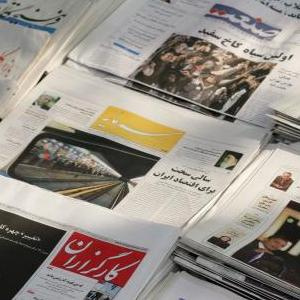Tehran's Daily Newspaper Review

Amid concerns over skyrocketing the US dollar exchange rate, Iran's self-congratulatory top headline reported of the government’s success in regulating foreign exchange market and its decision to revise foreign exchange-related policies. Mahmoud Ahmadinejad's visit to Armenia –with which Iran enjoys close ties- was also covered by the newspaper, along with a quote from the Iranian President: “Iran and Armenia share the same viewpoint towards global issues.” The newspaper reacted to Hashemi Rafsanjani’s election as the chairman of Islamic Azad University’s Board of Trustees, dubbing it “Hashemi’s resistance to change” in the billion-dollar worth quasi-governmental academic giant, which will further complicate the fate of the university.
In its top headline, Jomhouri-ye Eslami quoted Secretary of the Purposeful Subsidies Bureau Mohammad-Reza Farzin saying that cutting off the well-off households from cash subsidies has become operative. The newspaper also cited Mahmoud Ahmadinejad who reported of the government’s correspondence with the higher-class households in order to give up receiving the roughly 30 USD per month quota. The Iranian Army Navy’s launch of a military drill in an area that stretches from the Strait of Hormuz to the Gulf of Oman was also covered by the newspaper. “The naval force has no plans to block the Strait of Hormuz during the maneuver, though all depends on what decision the Nezam’s seniors make” Jomhouri-ye Eslami quoted the commander of the force Habibollah Sayyari. Following the recent chain of deadly blasts in Iraq, the newspaper’s editorial called for purging the country from the remnants of the Baath Party, to whom the explosions were attributed by the newspaper.
The blasts were called “United States’ crimson revenge on the Iraqi nation” by Kayhan, “following the invaders’ humiliating defeat and withdrawal.” The newspaper also covered the electoral stances of the ‘radicals’, that is, the less moderate Reformists, including Mousavi Khoiniha, called the Reformists’ Eminence Grice by the Conservative media, who had confessed that Reformists’ boycott of the parliamentary election wouldn’t make a significant change in the turnout rate. Kayhan also quoted former president Mohammad Khatami and some members of his cabinet who had denied the Reformists’ decision to boycott the election, a measure which could officially categorize them as an anti-establishment group. Kayhan’s editorial by Saadollah Zarei placed the blame for the deadly blasts in Iraq on the United States, as the country is infuriated over Iraq’s independent policy and its unwillingness to further host the American troops with legal privileges.
“Who is behind the nineteen explosions in Baghdad?” Resalat asked, quoting the Governor of Najaf Province who blamed the fugitive Iraq Deputy Prime Minister Tariq al-Hashemi. Resalat also interviewed the president of Habilian, an NGO founded by families of the victims of Mujahedeen-e Khalgh Organization (MKO) attacks, who spoke of the possibility of Iran hosting those members of the terrorist organization who have repented or have no blood on their hands. While a few months ago he had pleaded the Reformists to participate the parliamentary election, Deputy Speaker of the Parliament Mohammad-Reza Bahonar has turned tough on them, stating that “West and the Reformists follow a strategy of lowering the election turnout.” In the newspaper’s editorial, Mohammad-Kazem Anbarloui, tried to find an answer to his question ‘why did a part of the Iranian political elite go astray during the post-2009 presidential election developments?’ They reduced the unrest to Mousavi-Ahmadinejad head-on, ignored the reality of enemy’s plots to launch a ‘velvet revolution’ in Iran, and were fed with “poisoned” political material through “suspicious intelligence and communication channels provided by the enemy” the author argued.
The government’s suggestive –and of course controversial- appointment of new provincial governors on the threshold of parliamentary elections which had provoked the protest of Majles’ legislators and driven the Interior Minister to the brink of impeachment, has finally come to an end Shargh reported, following negotiations between MPs and influential Friday prayer leaders of Qazvin and Sistan-va-Baluchestan provinces with the government. The newspaper interviewed former deputy intelligence minister Ali Rabiei on Iran's policy of “Turn to Left” since Ahmadinejad's presidency, and the goods and bads of Iran's closer ties with China. “The Occupy Wall Street Movement is not calling for abolition of capitalism” stated renowned economic commentator Saeed Leylaz in an interview with Shargh.
* Notes:
The editorial section of Iranian newspapers is not the work of the editor-in-chief or the senior editorial staff of the newspaper by default, but can be a contribution by experts and politicians (typically agreeing with the newspaper’s political stance.) The newspapers may also occasionally publish without an editorial.
Vatan-e Emrooz daily does not publish on Thursdays.
Trouble with understanding some terms? Check our Glossary of Iranian Political Terms.
Briefing
Iran is the official organ of the administration. Its current editor-in-chief is Ali-Akbar Javanfekr, former media advisor to President Mahmoud Ahmadinejad.
Jomhouri-ye Eslami (The Islamic Republic) was known as the official organ of the Party of the Islamic Republic, founded in 1979 and disbanded in 1987. Currently, it is an open critic of Mahmoud Ahmadinejad's policies and is known to be a mouthpiece of Akbar Hashemi Rafsanjani.
Kayhan (Universe) is a hard-line conservative newspaper. Its editor-in-chief –currently Hossein Shari’atmadari- is directly appointed by Iran's Supreme Leader. Shari’atmadari’s editorials often spark off controversy and debate inside Iranian political circles.
Resalat (Mission) belongs to the moderate wing of the Principlist camp. Resalat’s best known analyst is Amir Mohebbian, its political editor.
Shargh (East) is a moderate Reformist newspaper. It was the most popular and influential Reformist newspaper in its first period of publication which lasted from August 2003 until September 2006.
Tehran-e Emrooz (Tehran Today) is a “Principlist/Reformist” newspaper, connected to Mohammad Baqer Qalibaf, Tehran Mayor and a likely candidate of the 2013 presidential election.

